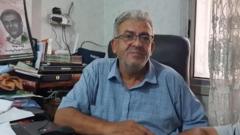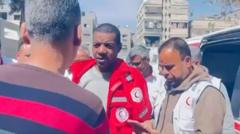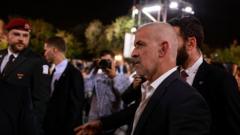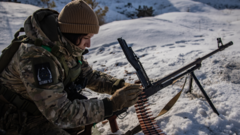Thousands of Israeli reservists express discontent with ongoing Gaza war, calling for an immediate ceasefire and efforts to rescue hostages.
**Israeli Reservists Raise Voices Against Gaza Conflict Amidst Rising Pressure on Netanyahu**

**Israeli Reservists Raise Voices Against Gaza Conflict Amidst Rising Pressure on Netanyahu**
Military veterans urge a shift in focus towards hostage recovery as dissent grows.
Recent developments in the ongoing Israeli-Gaza conflict show a significant shift in sentiment among Israeli reservists, as many have begun to voice their opposition to Prime Minister Benjamin Netanyahu's approach. In light of thousands signing letters demanding a halt to the fighting, the calls for negotiation and resolution surrounding the 59 hostages held by Hamas are growing louder.
Months after initially backing the war aimed at defeating Hamas and securing the release of hostages, public opinions have shifted dramatically. Citing the return from a ceasefire in mid-March, many are disillusioned with continuing military conflict. Danny Yatom, a former Mossad chief, stated, "We came to the conclusion that Israel is going to a very bad place," criticizing Netanyahu's motivations for prioritizing political stability over the fate of the hostages.
The pushback against the war's continuation started in early April with an open letter signed by 1,000 air force reservists, arguing that ongoing hostilities do not align with Israel's stated objectives and endanger the lives of the remaining hostages. Their letter urges fellow Israelis to advocate for a change in strategy before the risk to those hostages escalates further.
As dissent grows, reports indicate a drop in reservist attendance, highlighting a trend not seen since the first Lebanon war in 1982. Another reservist, who chose to go by "Yoav," remarked on his previous feelings of duty, stating, "I believed I was doing something good...But now, I don't see it in the same way anymore." He echoed concerns that the focus on defeating Hamas was overshadowing the crisis in which hostages find themselves.
Calls for ethical reevaluation from military and political spheres have also emerged. Retired military leaders have voiced their concerns and suggested that soldiers may need to contemplate disobeying orders to prevent potential war crimes and damage to Israel's reputation as a moral military force.
Yet, Netanyahu has dismissed these protests as politically motivated, characterizing them as propaganda from a minority of disconnected citizens. Nonetheless, recent polls indicate a growing consensus among the public advocating for a ceasefire and a focus on restoring the hostages.
In the streets of Tel Aviv, protests have seen demonstrators displaying images of hostages alongside images of Palestinian children, intensifying the emotions surrounding the conflict. The authorities, who initially attempted to restrict such demonstrations, quickly reversed course following public outrage.
While Netanyahu maintains that military pressure is essential for securing the hostages' return, the voices of Israeli reservists and public sentiment increasingly indicate a call for negotiation, dialogue, and resolution over perpetual conflict.
Months after initially backing the war aimed at defeating Hamas and securing the release of hostages, public opinions have shifted dramatically. Citing the return from a ceasefire in mid-March, many are disillusioned with continuing military conflict. Danny Yatom, a former Mossad chief, stated, "We came to the conclusion that Israel is going to a very bad place," criticizing Netanyahu's motivations for prioritizing political stability over the fate of the hostages.
The pushback against the war's continuation started in early April with an open letter signed by 1,000 air force reservists, arguing that ongoing hostilities do not align with Israel's stated objectives and endanger the lives of the remaining hostages. Their letter urges fellow Israelis to advocate for a change in strategy before the risk to those hostages escalates further.
As dissent grows, reports indicate a drop in reservist attendance, highlighting a trend not seen since the first Lebanon war in 1982. Another reservist, who chose to go by "Yoav," remarked on his previous feelings of duty, stating, "I believed I was doing something good...But now, I don't see it in the same way anymore." He echoed concerns that the focus on defeating Hamas was overshadowing the crisis in which hostages find themselves.
Calls for ethical reevaluation from military and political spheres have also emerged. Retired military leaders have voiced their concerns and suggested that soldiers may need to contemplate disobeying orders to prevent potential war crimes and damage to Israel's reputation as a moral military force.
Yet, Netanyahu has dismissed these protests as politically motivated, characterizing them as propaganda from a minority of disconnected citizens. Nonetheless, recent polls indicate a growing consensus among the public advocating for a ceasefire and a focus on restoring the hostages.
In the streets of Tel Aviv, protests have seen demonstrators displaying images of hostages alongside images of Palestinian children, intensifying the emotions surrounding the conflict. The authorities, who initially attempted to restrict such demonstrations, quickly reversed course following public outrage.
While Netanyahu maintains that military pressure is essential for securing the hostages' return, the voices of Israeli reservists and public sentiment increasingly indicate a call for negotiation, dialogue, and resolution over perpetual conflict.




















